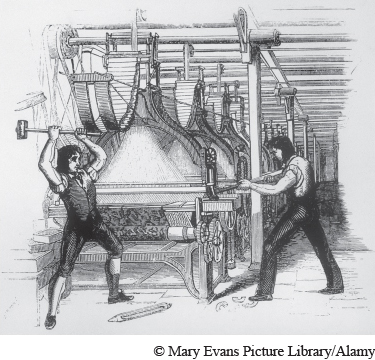The English Luddites and Machine Breaking

If you do Not Cause those Dressing Machines to be Remov’d Within the Bounds of Seven Days … your factory and all that it Contains Will and Shall Surely Be Set on fire … it is Not our Desire to Do you the Least Injury, But We are fully Determin’d to Destroy Both Dressing Machines and Steam Looms.28
B etween 1811 and 1813, this kind of warning was sent to hundreds of English workshops in the woolen and cotton industry, where more efficient machines, some of them steam powered, threatened the jobs and livelihood of workers. Over and over, that threat was carried out as well-organized bands of skilled artisans destroyed the offending machines, burned buildings, and on occasion attacked employers. These were the Luddites, taking their name from a mythical Robin Hood–like figure, Ned Ludd. A song called “General Ludd’s Triumph” expressed their sentiments: “These Engines of mischief were sentenced to die / By unanimous vote of the Trade / And Ludd who can all opposition defy / Was the Grand executioner made.”
So widespread and serious was this Luddite uprising that the British government sent 12,000 troops to suppress it, more than it was then devoting to the struggle against Napoleon in continental Europe. And a new law, rushed through Parliament as an “emergency measure” in 1812, made those who destroyed mechanized looms subject to the death penalty. Some sixty to seventy alleged Luddites were in fact hanged, and sometimes beheaded as well, for machine breaking.
In the governing circles of England, Luddism was widely regarded as blind protest, an outrageous, unthinking, and futile resistance to progress. It has remained in more recent times a term of insult applied to those who resist or reject technological innovation. And yet, a closer look suggests that we might view that movement with some sympathy as an understandable response to a painful transformation of social life when few alternatives for expressing grievances were available.
At the time of the Luddite uprising, England was involved in an increasingly unpopular war with Napoleon’s France, and mutual blockades substantially reduced trade and hurt the textile industry. The country was also in the early phase of an Industrial Revolution in which mechanized production was replacing skilled artisan labor. All of this, plus some bad weather and poor harvests, combined to generate real economic hardship, unemployment, and hunger. Bread riots and various protests against high prices proliferated.
Furthermore, English elites were embracing new laissez-faire, or free market, economic principles, which eroded customary protections for the poor and working classes. Over the previous several decades, many laws that had regulated wages and apprenticeships and prohibited certain laborsaving machines had been repealed, despite repeated workers’ appeals to Parliament to maintain some minimal protections for their older way of life. A further act of Parliament in 1799 had forbidden trade unions and collective bargaining. In these circumstances, some form of direct action is hardly surprising.
At one level, the Luddite machine-breaking movement represented “collective bargaining by riot,” a way of pressuring employers when legal negotiations with them had been outlawed. And the issues involved more than laborsaving machines. Luddites also argued for price reductions, minimum wages, and prohibitions on the flooding of their industry by unapprenticed workers. They wanted to return to a time when “full fashioned work at the old fashioned price is established by custom and law,” according to one of their songs. More generally, Luddites sought to preserve elements of an older way of life in which industry existed to provide a livelihood for workers, in which men could take pride in their craft, in which government and employers felt some paternalistic responsibility to the lower classes, and in which journeymen workers felt some bonds of attachment to a larger social and moral order. All of this was rapidly eroding in the new era of capitalist industrialization. In these ways, the Luddite movement looked backward to idealized memories of an earlier time.
And yet in other ways, the rebels anticipated the future with their demands for minimum wage and an end to child labor, their concern about inferior-quality products produced by machines, and their desire to organize trade unions. At the height of the Luddite movement, some among them began to move beyond local industrial action toward a “general insurrection” that might bring real political change to the entire country. In one letter from a Luddite in 1812, the writer expressed “hope for assistance from the French emperor [Napoleon] in shaking off the yoke of the rottenest, wickedest, and most tyranious government that ever existed.” He continued, “Then we will be governed by a just republic.”
After 1813, the organized Luddite movement faded away. But it serves as a cautionary reminder that what is hailed as progress claims victims as well as beneficiaries.
Questions: To what extent did the concerns of the Luddites come to pass as the Industrial Revolution unfolded? How does your understanding of the Luddites affect your posture toward technological change in our time?